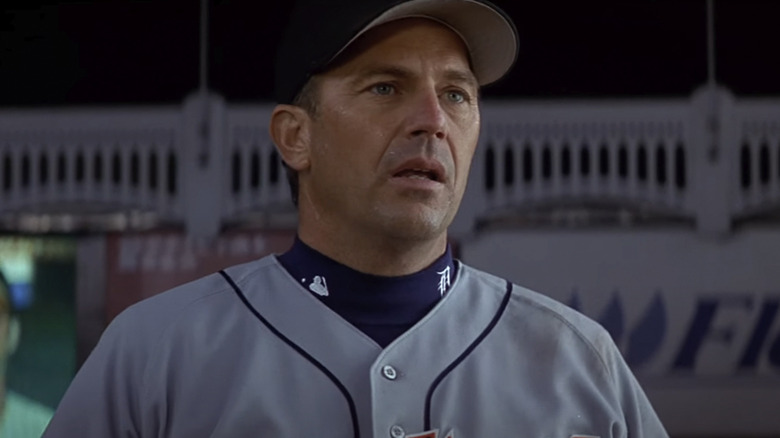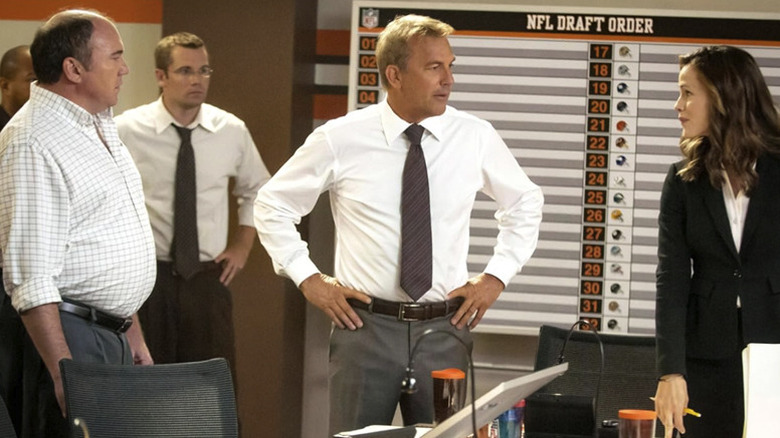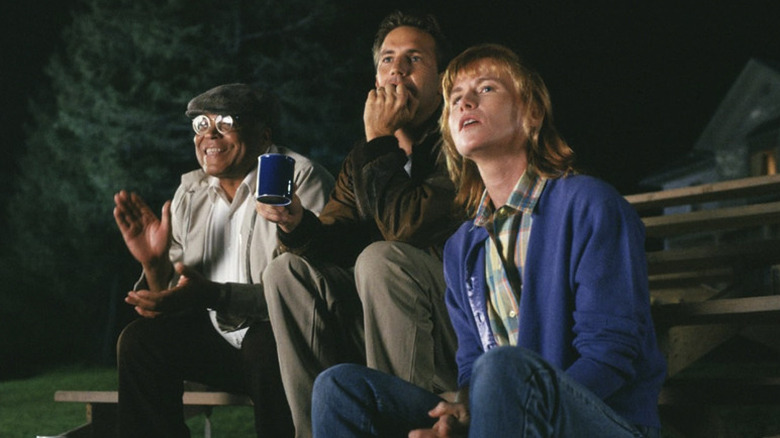Kevin Costner Thinks All Good Sports Movies Should Follow This One Rule
Kevin Costner knows sports movies, having starred in several of the genre's best and/or most successful. Baseball is of particular interest to the actor, as he has played baseball players in "Stealing Home," the sizeable hit "Bull Durham," the even bigger hit "Field of Dreams," Sam Raimi's "For Love of the Game," and the heady drama "The Upside of Anger." Additionally, Costner appeared in the cycling film "American Flyers," the golf film "Tin Cup," the football film "Draft Day," and the water polo film "Waterworld." (Kidding: "Waterworld" does not actually include any water polo, but there was some wild stuff that happened on the movie's set.)
Even when done poorly, sports movies can be inspiring and exhilarating. There is something comforting and reliable about the genre. Even if a sports movie boasts a predictable story about an underdog athlete, a sports team overcoming incredible odds, or a well-worn tale of an egotist champion humbled by real life, audiences are going to feel good on the way out. For American audiences, it may help if the sport in question is baseball, a sport that has become inextricably linked with the country (despite not having been invented here). There is something wistfully pastoral and patriotic about American baseball movies.
And no one knows more about being wistfully pastoral and patriotic than Kevin Costner, a man who built his career and public image on American Westerns and sports movies. Back in 2014, Costner spoke with Collider about his then-new film "Draft Day," an Ivan Reitman film about the drama that takes place behind the scenes during the NFL's annual player draft. Costner was asked about sports movies in general, and he had a simple answer for how to make one turn out well. Sports movies, he says, aren't really about sports, but the characters. Focus less on the game, and more on the people, and you'll have a hit on your hands.
Kevin Costner says good sports movies focus on people, not sports
Costner seems to have a pragmatic view of mainstream Hollywood cinema, and recalls that audiences do indeed have to leave the house and buy tickets to see movies. He imagines the American filmgoing public as slightly worn out from a hard day at work, and eager to use films as an emotional salve. As such, long speeches about the technical aspects of sports won't do. There needs to be something, Costner feels, for an audience member to connect to beyond the minutiae of the game itself. He said:
"I think if you want to make a good sports movie, you've got to cut down on the sports. You have to make it about people. You can't try to impress people with your knowledge and the X and O's and all the details and the technicalities. 'See, we know about this sport.' You gotta know that people are going to sit down. They will have gotten babysitters. In certain instances, they're going to be like, 'Why are you dragging me to this movie?' And then what happens is you have to conduct scenes that can speak to that person [...]
Costner then repeated an imaginary conversation between a football-loving spouse and a football-indifferent spouse wherein the latter asked why they would want to see a football movie when football is always on TV at home, and the former pleading to their partner to attend anyway ... while also pleading quietly to Costner to make the movie good. Costner didn't write, produce, or direct "Draft Day" (which we reviewed here upon its release), but he knows that he'll be the film's face, and hence, in his example, the person to which football lovers, with their football-indifferent spouses, will be pleading.
Movies are better when people can see themselves in them
Costner knows the age-old adage that people walk away from movies not necessarily remembering the story, but small, meaningful moments. This author happens to agree: Story is less important to movies than most writers and critics might lead you to believe. Audiences typically fall in love with movies because of their characters, small emotional climaxes, or even a general tone, not necessarily because the story was terribly unique or clever. To underline that point, Costner said:
"That's when movies are always going to be at their best. It's when they are about moments, and I've said before, the smallest gesture that maybe you never ever forget. There are too many movies that we see that we can't remember one thing from them. Sometimes the thing you remember is the wink. If you can orchestrate a movie where we remember wanting to have a catch."
Costner then pointed out that the big emotional climax of his hit film "Field of Dreams" wasn't a Big Game, an action chase, or a fistfight, but a moment wherein a son asked, "Dad, do you want to have a catch?" It's about playing ball with someone you care about, not who triumphed in a massive conflagration. "At that moment," Costner said of "Field of Dreams," "we all broke over a single line. Because why? Not because we all wanted to play baseball, but we've all had a life where things have gone unsaid in our life to somebody we actually really love."
For Costner, that makes a film more emotionally honest than a mere victory. He believes in people over points.


